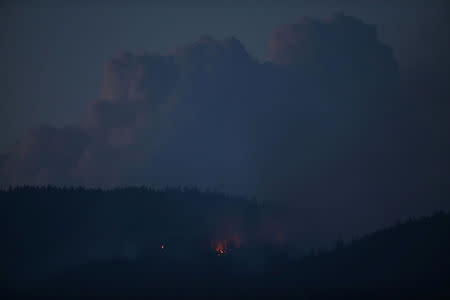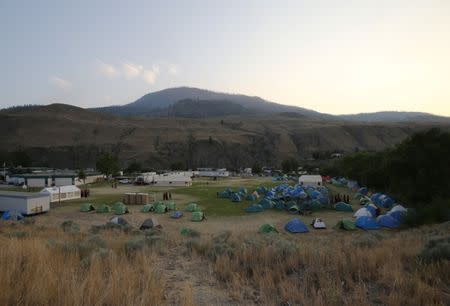State of emergency in British Columbia extended as wildfires rage
By Nicole Mordant VANCOUVER (Reuters) - British Columbia's government took the unprecedented step on Wednesday of extending a state of emergency by two weeks as it battled 140 wildfires that have forced about 45,000 people from their homes. The province's Premier John Horgan said evacuated households would receive C$600 (366.05 pounds) from the government to cover basic needs for every 14 days they cannot return home. The government announced the first such payment earlier this month after establishing a C$100 million fund. "Traditionally when an emergency is declared people are usually back in their homes within the two week period. That may not be the case for many individuals," Horgan told reporters, in his first major announcement since taking office on Tuesday. On July 7, the Canadian province declared its first state of emergency since 2003 as gusty winds fanned fires that were caused by lightning and humans in the tinder-dry central and southern regions. The fires have shut mines and timber operations and damaged homes and electrical infrastructure. Canadian military aircraft have joined thousands of firefighters from as far away as Australia to battle the fires. On Wednesday, 140 fires were raging in the province, down from 163 on Sunday, British Columbia chief fire information officer Kevin Skrepnek said, attributing the drop to cooler, less windy conditions. The estimated area of land burnt since the beginning of the wildfire season on April 1 was 353,000 hectares (872,282 acres), costing the province C$105.3 million, Skrepnek said. The Insurance Bureau of Canada said it was too early to provide cost estimates of the fire damage. Skrepnek said heavy smoke made it difficult to gauge damage to homes and other infrastructure. Mining and milling operations at the Gibraltar copper mine had resumed after being shuttered for four days as fires restricted access to the mine site, owner Taseko Mines said. Major pipeline companies in region, including Kinder Morgan Canada Ltd, a unit of Kinder Morgan Inc, have created fire breaks, installed sprinklers and taken other measures to protect operations. West Fraser Timber Co and privately held Tolko, among the largest Canadian producers of forestry products, and Norbord Inc, have suspended some operations. Residents of Cache Creek, a small ranching town of 1,000 in south-central British Columbia, were allowed to return home on Tuesday after 11 days in shelters. (Reporting by Nicole Mordant in Vancouver; Editing by Toni Reinhold and Grant McCool)

 Yahoo News
Yahoo News 



